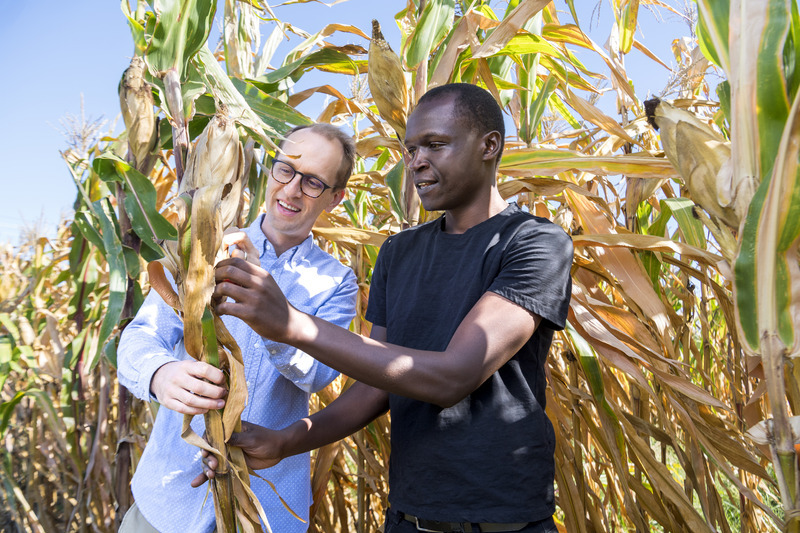


Examining food systems
Photo by Kathy F. Atkinson August 22, 2025
UD Associate Professor Kyle Davis reflects on time at UD, receiving NSF CAREER Award
When he was an undergraduate student at the University of Delaware, current UD associate professor Kyle Davis had the chance to participate in a study abroad program to South Africa, led by Professor Emeritus Norma Gaines-Hanks. He remembers the moment everything clicked, and he discovered his passion for research on food systems.
“That study abroad got me interested in development challenges and food systems and how they interact with the environment,” Davis said. “In addition, the excitement of scientific discovery came from conducting summer research at UD as an undergraduate with Professor Neal Zondlo. Those two things together really helped shape my interests as to what I wanted to do for my next steps.”
Now, as an associate professor with joint appointments in UD’s Department of Geography and Spatial Sciences and the Department of Plant and Soil Sciences and a resident faculty in UD’s Data Science Institute, Davis has been awarded with a National Science Foundation Early Career Development Award to continue his research looking at food systems.
Davis will use the award to understand where climate variability and climate extremes — like droughts, floods and heatwaves — are affecting food production and how those impacts to production move through the food supply chain to ultimately affect diets, nutrition and food security.
“The focus is on the food security of the United States and how the country’s food supply is exposed to different types of extreme climate,” Davis said. “For example, many of the berries we eat come from Mexico. If you have a drought or water shortage in those producing regions of Mexico, what does that mean for the total berry supply to the United States and what might that ultimately mean for our food prices and nutrition?”
With the award, Davis will also have funds for a summer research fellowship program, where he envisions graduate and undergraduate students working together on research related to climate disruptions and food supply chains. This will go hand-in-hand with developing learning activities for Delaware public high schools with the goal of introducing students to systems thinking and concepts of sustainability. Davis will work with the Delaware Center for Geographic Education, directed by Mary Schorse, to connect with high schools throughout the state.
Blue Hen experience
During his time as an undergraduate at UD, Davis studied biochemistry and had the opportunity to conduct summer research, which allowed him to fall in love with the scientific process.
“Those summer research experiences made me appreciate that I really loved the act of new discovery and uncovering things that people had previously not known before,” Davis said. “That was really exciting for me.”
His experience during study abroad also helped to open his eyes to a wider world than the one he had known growing up.
“Before going on that study abroad, I had a pretty sheltered upbringing — the United States and Europe were the extent of my worldview and exposure,” Davis said. “Going on that study abroad helped open my eyes to the different ways of life across the planet and the diverse challenges that people are dealing with and adapting to in different places.”
Davis credits his experience in Nigeria after he graduated with helping to set him on the path to his current career.
After his study abroad in South Africa, Davis did not want to jump right into graduate school and decided to continue to work in Africa. Facilitated by the late Babatunde A. Ogunnaike, William L. Friend Chair of Chemical Engineering and former dean of the College of Engineering at UD, Davis completed a year-long internship in Nigeria under Prof. Labode Popoola at the University of Ibadan’s Center for Sustainable Development.
“That crystallized for me the topics that I was interested in and was in large part the reason why I went on to do my Ph.D. in environmental sciences,” Davis said. “Every day, we were grappling with questions related to sustainable development and how to achieve a more sustainable and equitable future in the context of Nigeria and globally. I’ve been involved in research there ever since.”
Davis said this time also helped him appreciate that persisting development challenges are rarely as simple as they may seem.
“Living in Nigeria was truly a blessing. One of the clearest lessons I learned is that it is not possible to solve sustainability challenges from the outside — you need to fully appreciate all the details, all the history and all the reasons why these things might have not been solved yet because they're incredibly complicated,” Davis said. “You need to understand what people's priorities are, what the different forces at play are, and who are the groups working toward effecting positive change. Only then can you as a scientist begin to craft your research in a way that truly fills an unmet need.”
Contact Us
Have a UDaily story idea?
Contact us at ocm@udel.edu
Members of the press
Contact us at mediarelations@udel.edu or visit the Media Relations website

